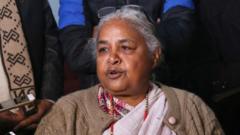Will Nepal's First Female PM Bring Lasting Change After Unrest?

Published: 2025-09-12 16:45:09 | Category: world
Former Supreme Court chief justice Sushila Karki has taken office as Nepal's interim prime minister, marking a significant milestone as the first woman to lead the nation amid intense anti-corruption protests. These demonstrations, triggered by a government ban on social media, escalated into a mass movement resulting in the ousting of Prime Minister KP Sharma Oli and significant unrest in Kathmandu.
Last updated: 05 October 2023 (BST)
Key Takeaways
- Sushila Karki is Nepal's first female prime minister.
- Her appointment followed severe anti-corruption protests resulting in over 50 deaths.
- The protests were sparked by a government ban on 26 social media platforms.
- Karki has a reputation for integrity and is supported by the youth.
- Parliament is expected to be dissolved shortly.
Background of the Protests
The recent turmoil in Nepal began when the government enforced a ban on 26 social media platforms, including popular services like WhatsApp, Instagram, and Facebook. This decision, perceived as an attempt to stifle dissent and control public discourse, sparked outrage across the nation. Protests ignited rapidly, leading to violent confrontations with security forces.
The Escalation of Violence
As demonstrations grew, clashes between protesters and riot police intensified. Reports indicate that over 50 people lost their lives in these confrontations, with many others injured. The situation escalated further when protesters set fire to parliament and various government buildings in Kathmandu, prompting a critical response from the authorities.
Karki's Appointment as Prime Minister
In response to the deepening crisis, President Ram Chandra Poudel's press adviser confirmed that Sushila Karki would be sworn in as the interim prime minister. Her appointment was formalised during a brief ceremony, signalling a shift in leadership amid the ongoing unrest. Legal experts were involved in the discussions leading to her selection, indicating a collaborative approach to restoring stability.
Karki's Political Significance
As the first woman to assume the role of prime minister in Nepal, Karki's appointment is a historic moment for gender representation in a country where female leadership has been scarce. At 73, she is regarded as a figure of integrity, with many viewing her as a stabilising force capable of navigating the nation through its current challenges.
Public Response and Support
Karki's leadership has garnered support from various demographics, particularly from the younger generation, including student leaders from the so-called "Gen Z". This group has actively participated in the protests, demanding transparency and accountability from the political elite. Karki's visit to the protest site, where many were injured, showcased her willingness to engage with the public and acknowledge their grievances.
Controversies and Challenges Ahead
Despite her clean image, Karki’s political journey has not been without controversy. During her tenure as chief justice, she faced an impeachment incident, highlighting the contentious nature of Nepal's political landscape. As she steps into her new role, Karki will need to navigate both public expectations and the underlying tensions that have led to the current unrest.
What Happens Next?
With parliament expected to be dissolved shortly, Karki's government will face immediate challenges in establishing a stable interim administration. Key issues will include addressing the demands of the protesters, restoring public trust in the government, and managing ongoing security concerns as the army patrols the streets of Kathmandu to maintain order.
The Broader Implications of the Protests
The protests that led to Karki's appointment reflect a broader discontent with the political elite in Nepal. In the weeks leading up to the unrest, a "nepo kid" campaign emerged, highlighting the extravagant lifestyles of politicians' children and raising allegations of corruption. This movement resonated deeply with the public, further fuelling the protests.
Conclusion: The Path Forward
As Sushila Karki embarks on her tenure as interim prime minister, her administration will be closely watched both domestically and internationally. The key challenge will be to address the root causes of the protests while ensuring that democratic processes and civil liberties are upheld. The future of Nepal’s political landscape hangs in the balance as citizens seek accountability and reform. What will be Karki's approach to mend the fractured relationship between the government and the populace?
#NepalPolitics #SushilaKarki #AntiCorruption
FAQs
Who is Sushila Karki?
Sushila Karki is a former chief justice of Nepal and the first woman to be appointed as the interim prime minister of the country, following intense anti-corruption protests.
Why did the protests start in Nepal?
The protests were triggered by the government's ban on 26 social media platforms, which many viewed as an attempt to suppress free speech and dissent.
What happened during the protests in Kathmandu?
Protests escalated into violent clashes with police, resulting in over 50 deaths and significant damage to government buildings, including the parliament.
What challenges does Karki face as interim prime minister?
As interim prime minister, Karki must address public grievances, restore trust in the government, and navigate the ongoing unrest while ensuring stability in Nepal.
What is the significance of Karki's appointment?
Karki's appointment is significant as it marks the first time a woman has led Nepal, symbolising progress in gender representation within the country's political landscape.


